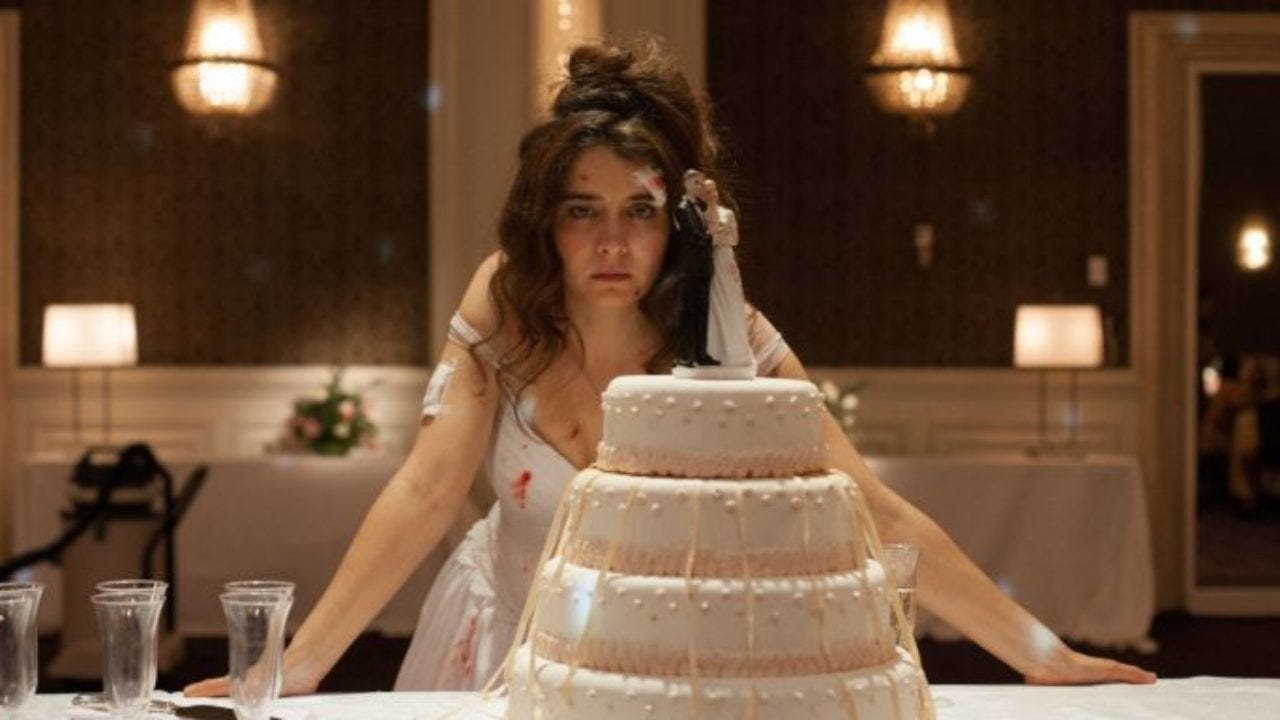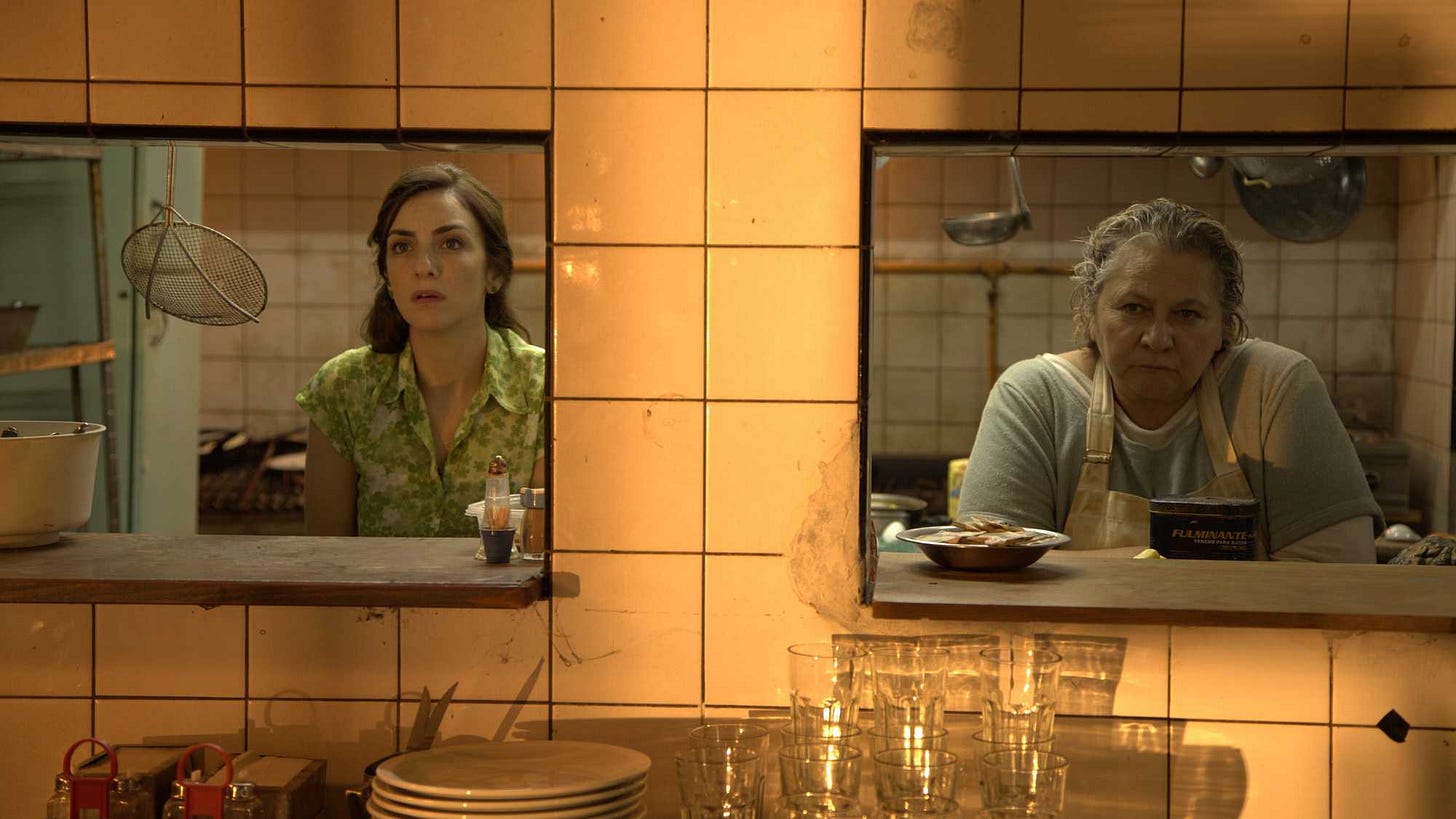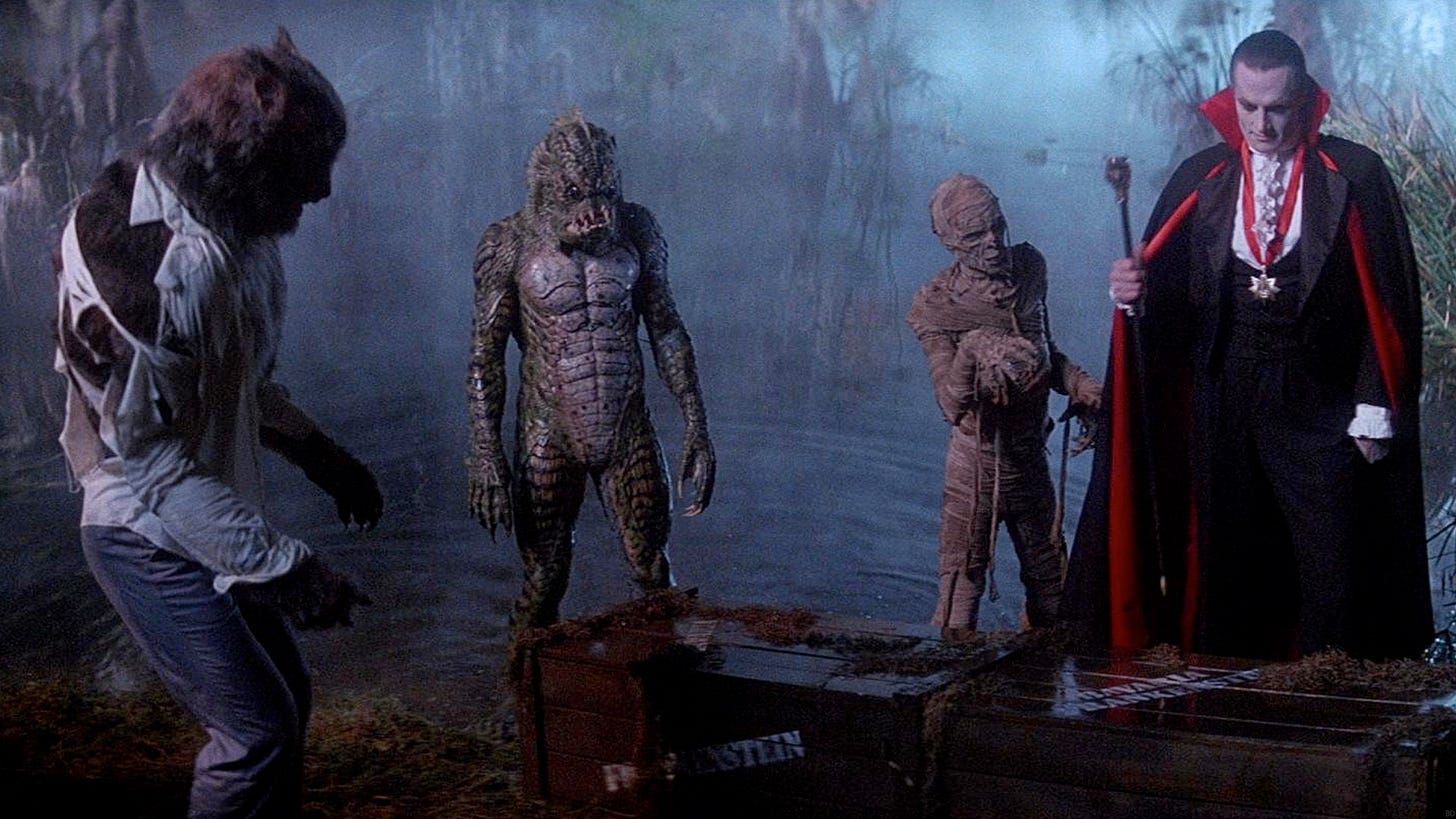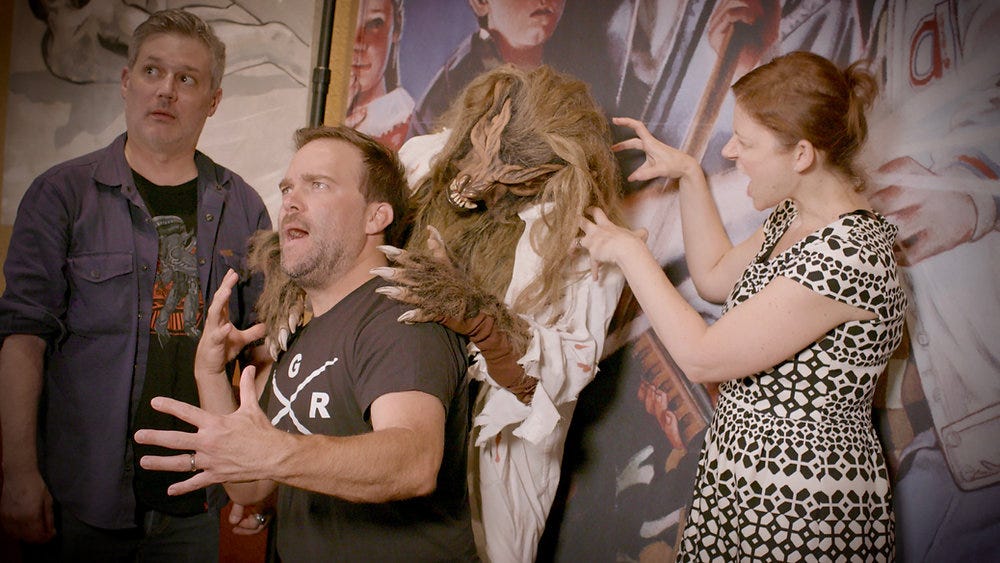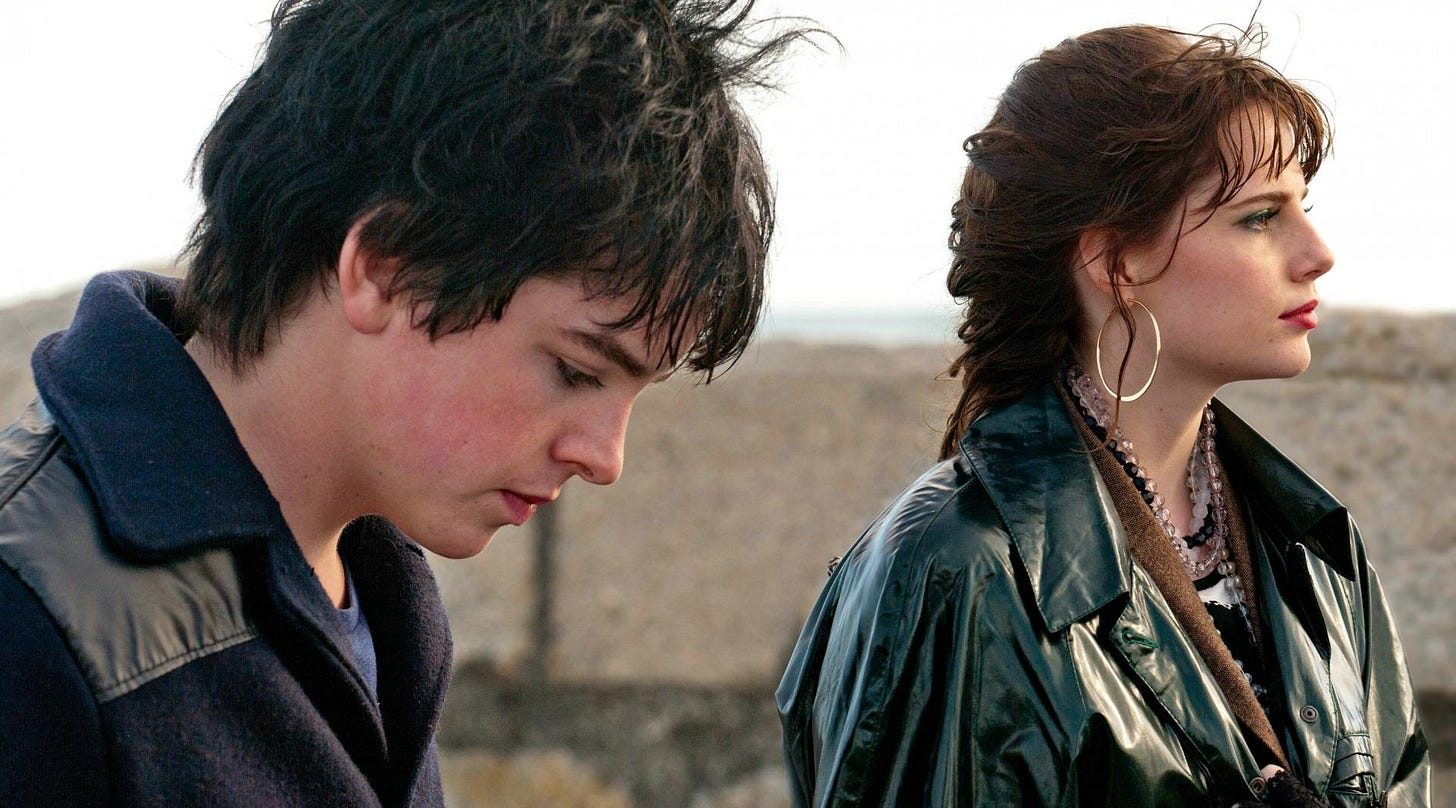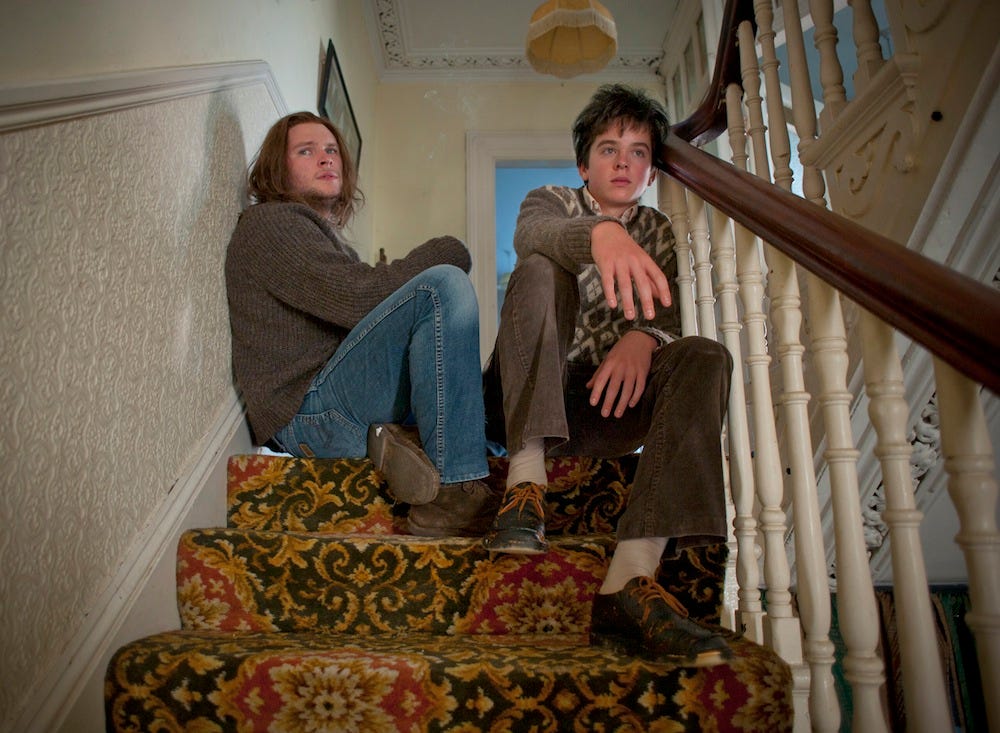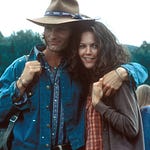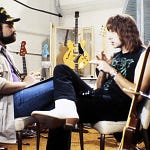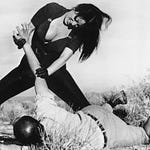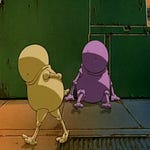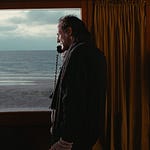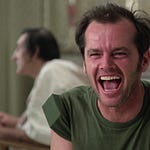It took us a long time to record season one of The Hip Pocket.
Part of the reason we decided to record a full season without guests was because it allowed us to set the pace and work on it when we had a chance. By the time we reached these last few episodes, though, we were feeling pretty good about the show and our chemistry and the format, and we recorded these close together and with some sense of momentum.
I’ve known Craig for quite a while, so I’m not surprised I’m enjoying working with him this much. Aundria is still a new friend, though, and one of the key delights of the show is slowly getting to know more and more about her. Sharing movies and talking about them like this is a great way to see who someone is, and that’s absolutely been the case here.
Talking about more recent movies puts everyone on more equal footing, and I feel like this episode is the loosest, most conversational one so far. I’m curious to see if you feel the same way. Let’s dig right in!
[the Hip Pocket theme plays]
Welcome, everybody. I'm Drew McWeeny and this is The Hip Pocket. What is a hip pocket movie? I think they're the films that we hold close to us, movies that we love for whatever reason, movies that we share with people, good movies, bad movies, blockbusters, forgotten indies. What matters is the reason why these are the films that stick to us. There's no better conversation to have with another movie lover to get to know them.
I love having these conversations with my two friends in particular. First up, there's my bandleader, my old buddy, Craig Ceravolo. Craig, how are you today, man?
CRAIG: I’m good. How are you?
D: I am doing well. I'm actually having a, a good mellow week for once.
C: Love it. I can hear it in your voice.
D: Yeah.
C: You, you have a very zen-like tone today.
D: Yeah. A little bit light. Let's get a… we, we can't start the party without our cruise director, so bring on my co-host, Aundria Parker. Aundria, how are you today?
AUNDRIA: I am doing amazing, gentlemen. We have a fun-filled day full of activities for you. We'll be starting on…
C: You’re like Julie from Love Boat.
A: I, I… totally. Thank you. Yes. Yes. I'm like, what do cruise directors do? Oh, yes. Stuff. Okay. Got it.
D: This is… we are rounding, finally, the homestretch on this opening introductory get-to-know-you season of The Hip Pocket. And we're finally getting to very current territory, very recent territory. The 2010s are our first episode today. I can't even do a nostalgic opening because it feels like this was eight minutes ago and culture never changes now. I know it was a good first half to the decade, at least, in the years before the Orange Menace descended on America. Otherwise, I swear to god, I cannot believe we are almost halfway through the decade after this.
Time is a blur at this point. This was the decade that I went from HitFix to what the fuck. I had to figure out how to kinda stay afloat when venture capital buzzards bought my website as some kind of tax fraud bust out and fired everybody who made a grown-up salary. So since then, I've been working to figure out how to build an independent space for myself in, like, the eight or so years since that happened. Kind of amazed I'm still publishing and doing things without any corporate conglomerate behind me, and really happy to have you guys join me in whatever this new venture is gonna be.
C: Well, I'm excited too. And I remember those days, those turbulent days. So Hey. I'm happy to see where you are now for better for better.
D: Yeah. I do too. I actually I really, I I enjoy not having the same kind of, I have to review everything schedule. I get to be more selective about what I'm writing these days. And as a result, I actually feel like I'm enjoying movies more again. You know, we're gonna jump right in. My film, that we're gonna open with this week, is one that I saw at Cannes, back when I was doing that, when I was still doing my annual routine of going to every film festival.
And I remember standing up at the end of this one and flipping out in the balcony at the Grand Palais. I could not believe the movie I just seen. Even now, I adore it. Every time I watch it, I marvel again at the balls that it took to make something as truly in your face and rowdy as Wild Tales.
[the trailer for Wild Tales plays]
D: So had you guys seen this or heard of this before we did this one?
A: I had heard of it. I had not seen it. I think way back when it had come out, Bret Easton Ellis was recommending it on his podcast. So it kind of set a little ding in my head to keep an eye out for it. And then just by sheer happy luck and coincidence, I didn't see it. So it was a first-time watch for me.
D: I’m so excited. And Craig?
C: No. I'd never seen it. It was… I, I, I, I came in so cold on this that it was such a joy to… just, from the airplane opening to the end… to the wedding ending… it was just… what I love, it was one of those where you're like, Oh my god. I love not knowing…. when… to go in cold on something, it's the best.
D: Well, and that was that was the way I saw it at the festival. I, you know, walked into the theater. I did not know, Damien Szifron at all as a director or as a filmmaker. I had not seen any of his TV work. And he really is not a… even now, he's not a wildly well-known Argentinian filmmaker. But this was a Spanish-Argentinian co production, and it came… it was originally supposed to be a series of films. He started writing these stories that were all drawn from incidents in his life. He had a road rage incident. He started thinking about What happened if I hadn't let go of it? and then start… each of these kind of came from a seed of something that was real. And then after a while of kind of working with it, he realized, No, I think this is one movie. I think I just wanna do the moment where the people break and really focus in on that as the the storytelling. And it opens… there's a lot of people in this film who, if you know Argentinian films at all, these are, like, superstars of Argentinian cinema. The guy who plays the dynamite expert is Ricardo Darin, and Ricardo Darin is truly the Robert De Niro of Argentinian cinema. He's in everything, and he's one of those guys who's been around for decades and done it all. And seeing him as Mr. Boom, as the, the guy who does the demolition stuff? Terrific. What a great use of him.
It's an anthology film. And for those who haven't seen it, it is really just about what happens when we reach, in our modern lives, these points where we are pushed past what we can take. And he finds different comic ways into that. And it's dark. It's really, really dark stuff. That open… and they, I think what does it is the opening tells you just how dark they're gonna go. If they're gonna…
C: Yeah.
D: … use a jumbo jet as that punch line, you're like, oh, it's all on the table. Anything could happen in this movie, and that's so exciting. I know, for me, my favorite storyline out of the entire film, and I really like each of the individual segments… I think each one does something very, very well… I love the wedding episode, the film's closer. And…
C: Yeah.
D: … I have got to say, I think Erica Rivas, who is the star of that segment, should have been Oscar-nominated that year. That performance is unbelievable. And it's just a woman who, on the day of her wedding, realizes at the reception that her husband has slept with a bridesmaid. And she decides to be a chaos agent at that point.
A: As she should be.
D: No. Oh, it's absolutely… it is justified. I… she is a wrecking ball from that moment on.
C: And it's so satisfying to watch the chaos. It’s… there’s, there's a catharsis in what she does where you're like, Yeah. Yes, sister. What else can you do?
A: Exactly. Like, as she kind of moves through the reception and she goes upstairs, she goes downstairs… like, as she's moving to these different places, you're, like, what, what is she lighting on fire now?
C: Oh my God. Yeah. I’m, I'm replaying that dance scene in my head right now.
D: Oh my god.
C: Yeah. Oh my god.
D: The rooftop scene… with the guy on the rooftop… is fantastic.
C: Nuts.
D: Yeah. I, I really… I think it is a singular performance. She just attacks it.
[clip from Wild Tales plays]
D: Oscar Martinez is another one of these giant Argentinian stars, and he's the father whose teenage son is in the car accident. I think that segment is my favorite of the social commentary segments, where he really… the, the idea of what the rich guy is willing to do, the idea that money fixes problems, the way it really gets into a class… it, it analyzes class in a very canny way, but it does it quickly. It is just… it's brutally efficient storytelling in each of the segments. And some of them are more cartoonishly-built. The, the road rage segment is just…
A: Oh my god.
D: … but it's a phenomenal punch line that… it's like, it’s, Well, that’s, that's what people are gonna remember now. Well done, guys. But then I think the, the stuff like the dynamite expert episode and the one about the, the hit and run… I think those are really cutting. And I think they have a lot to say about how Argentina was at the moment. And, you know, Argentina, like a lot of the world, has kinda gone even more right over the last decade or so. And I think this movie was made in a moment where the country was kinda wrestling with which way they were headed. So it's an angry film. It's a funny film. It's incredibly well-performed. I'm just excited you guys got to see it and see it without knowing much walking in.
A: Nothing. Nothing other than the recommendation. So going in blind and finding these… not… I'm not finding anything on my own. You’re pointing out these… like, we're in a mine, and we've all have pickaxes, and you're, like, right there. Hit that part of the wall. You know what I mean? Like, so, it's these gems just, like, falling into my lap, I feel like. Man, I hate planes and movies with planes… well, I mean plane crashes… not my favorite, and they are so unsettling, and the, the setup for the opener, like, there's no way… this movie just blows your skirt up from the jump. Like, it's so… and then it just keeps going. It just rolls into that restaurant scene and… you know what I mean? It doesn’t… you don't get a breath. And I think you saying that it was supposed to be, you know, multiple films, and they were just like, fuck it, let's just cut the fat out, give just the prime, you know, the moment of breakage for all of these people. And it’s, it’s… yeah, it's rad. It's so breakneck. I love it. Loved it.
C: Yeah. And that’s, that's what I… my note was, is that I did love how fast it gets to the point. So it’s, what, it's six… is it six stories? I tried to keep count.
D: It's six stories, but seven if you count the opening as a separate story.
C: Okay. I mean, that's a lot of vignettes for a, for a feature-length film. Right? And so, he go… obviously, he goes, we gotta just get to the point. And it gets to the point every single time that… I, I just love it. And I guess maybe my ADHD loved it.
A: Same. Same.
C: Fast.
D: Yeah.
A: Yeah. Well, anthology films are so… they're, they're never… they're very rarely good from start to finish, right? There's always a little dead…
D: Yes. That's a great point because it's so true, especially with horror anthologies. It's always like, oh, there's the one or two that you gotta sit through to get to the good shit.
A: Yep. And this really doesn't have a miss in the bunch. Like, it is… not to oversell it or anything, but damn. Like, it is a great anthology, and there's no… there's no slowing down. There's no points where you're like, I'm gonna pick up my phone, or whatever. Because like you said, it's all, all hits. All… what is it? All killer, no filler? Yeah.
D: Yeah. Yeah. There you go.
C: You know, I wrote down Cat's Eye for some reason. I don't know. Because I loved… and anthology films were big in the ‘80s. Right? It was, like…
A: I’ve written about Cat’s Eye. I have a deep affection for Cat’s Eye.
C: I do, too. I love… I love it so much. But, you know, Tales from the Crypt. No. Is that what it is?
A: Southbound is another one that just came out recently that's pretty stellar, start to finish, for horror.
D: By Roxanne Benjamin. Terrific little film.
C: Yeah. Or V/H/S. Yeah. I know. I can rattle them all off. But this one… that… you're right. There's not a single dud in the entire one. And it’s…
A: I wouldn't call it this…
C: You can watch this on Amazon. Yeah. It's on Amazon. So it's readily available. Yeah.
D: Oh, this one is?
C: I think so. I know I watched it…
D: Oh, nice. Okay.
C: … like I did. I feel like that’s… I feel like I…
A: I also feel like this is, like, the definition of a, a perfect hip pocket, because most people probably haven't seen it, and you're just gonna blow minds when you… when you, you know what I mean? Like, people aren't expecting it.
D: I remember the year it came out, I spent, you know, however many months telling people I thought it was great, and it got a cursory release here in the US. I was mainly interested for once it got to home video because as soon as it got to home video, I just started showing to people. And it was the most fun to… somebody would come over and they go, you wanna watch something? I'd be like, yeah, yeah, I got something. And I put it on, and inevitably, at the end of “Pastornak,” they'd be, like, what is this thing? And then you're just in. And, yeah, it was so much fun to drop on people without any sort of prior context or warning. And I, I do think it's only gotten in some ways more pointed since it came out. I, I think the points it makes about, sort of, how we all feel and how modern life frequently puts you into a box that you have no easy option out of, and these awful breaking points that we reach feel inevitable. Like, the, the system is just rigged to make us break at some point, so there is something beautiful about the way he expresses each of the versions of that in this movie.
A: And it also feels… they feel very universal. Like, all of us are only, like, three steps from that breaking point on any given day, right? Or, I mean…
D: Absolutely.
A: … as cartoonish as they are.
C: Yeah. Look at the whole towing situation. Oh my god.
D: Yeah. Oh, god, and it’s, it's the perfect storm of, just, well, those are the rules.
A: Yeah.
C: Yeah.
D: And, yeah, okay. I guess I'll play your game then. Let's go.
A: Yeah.
C: Yeah. It reminded me of Gardner, Drew. Hollywood and Gardner. Like, the, the, the…
D: Very much so.
C: … the fascist Los Angeles parking authority.
D: Well, I'm really glad you guys responded to it. It’s, it's one of those that I I, I hold really dear, and I'm glad that you guys now can start dropping it on other… we were talking recently about Almodovar, and he is a producer on this thing. And it was a case where he was a big champion for this filmmaker and helped him get this made. You can feel that influence in kind of the way the world works, especially the diner story. That feels like…
C: Oh, yeah.
D: … if that was a whole movie, I could easily see that be an Almodovar film.
C: Absolutely.
D: The cook in that movie would be one of his lead characters. She's terrific.
A: She's so badass.
[clip from Wild Tales plays]
D: Andrea, I had, I had a really weird…
A: Did you just call me Andrea?
D: Aundria. Excuse me. I did not.
A: I didn't think you did. That's okay. I was just checking.
D: You're gonna… you're gonna double it and triple it. I know it's gonna be… it's gonna be like an echo.
C: Drew, I got you in the edit, don’t worry.
D: Go back in and make it sound like she's crazy. I just said that.
A: Yeah. That'd be… yeah. Say it perfectly normal and have me be like, Drew, did you?
C: I, I get… I'm not gonna edit this. Go ahead.
D: … had a pretty serious out-of-body experience, watching your movie. And I've seen it before, but I… it is weird now, especially with the remove of time. I must know 90% of the people who pop up onscreen in this movie… well. Like, hang out with them well. Like, it is truly bizarre to me, and especially because Eric Vespe being dead-center in this thing… and Eric's my… he's my little brother, man. Like, I… we, we were just [unintelligible]
A: I didn't even think of that.
D: It is a wild experience. And for those of you who don't know what I'm talking about, it is a documentary about fandom, and in particular, the fandom around one movie, The Monster Squad. The documentary is called Wolfman's Got Nards.
[the trailer for Wolfman’s Got Nards plays]
D: So, yeah, Aundria, why did you pick this one? And a fascinating pick to, to do this and we didn't do The Monster Squad in the ‘80s. We're just doing the film about the fandom of The Monster Squad.
A: I know, and that was kind of perhaps not my brightest choice. But I…
D: A great choice!
C: Yeah. I’m, I’m, I’m… I've been waiting to talk… to hear this. Go. Go.
A: So, obviously, as this film shows, the fans of Monster Squad are crazy rabid fans. It has a fan base on par with any other cult film, but yet a lot of people still don't know about Monster Squad. So I don't feel like this documentary ever got its day in the sun. And as far as fan-service documentaries go, if that's what you wanna call this, this is incredible. I think it's made not… first of all, it’s, it's directed by Andre Gower, who is one of the stars of The Monster Squad. So, obviously, he's got a personal investment in telling the story.
But he's telling the story of the film, how it was made, and how it's found its audience over the last thirty years. But it’s made with so much affection for not only the people involved in the production but the people who love this movie. And it's never snarky or kind of winking that these people are nerdy, although we totally all are. I just remember being really touched by it and, and learning about the production of it, how it was basically a complete failure at the box office… hearing Fred Dekker, the director, talk about it, just being incredibly vulnerable with his experiences, how he felt after it failed… you know, this was supposed to be his his real break-in.
And, and it didn’t… it didn’t, it didn't do anything. And also… who knew that my Shane Black love started when I was so young? Like, when I put together that Shane Black was one of the co-writers on this… man, that clicks in pieces. So I just, I really like sharing this film with people because I think it's special. And I don't know why I didn't think about maybe you guys hadn't seen Monster Squad. So I know Craig did it backwards…
C: Fascinating.
A: Yeah. But… yeah, I, I just wanna… I like to share this movie with people because it's nice to see something about fandom that is genuinely warm and supportive.
D: Well, I, I mean, Monster Squad was a movie that played a theater that I, I worked at and managed in ’87. We got everything that DEG put out, so that was one of them. And, sure enough, we got it. And it did not hit at the time. Like, it didn't click with a lot of people. We enjoyed it. Like, all the people that worked at the theater saw it, had fun with it. I thought it was charming. And it's funny that the title Wolfman’s Got Nards is… it, it is a defining line for the movie…
A: I have to say, though, I hate the title. I hate…
D: I know, but it’s… it is indicative, though, of, I think, a thousand… what people who bounced off the movie in the ‘80s, it's what they bounced off of, which is, it's genuinely a kid's movie, but it also genuinely kinda has an edge to it. And the ‘80s were great at that. I, I don't know why this one didn't quite walk the tightrope, but I think that's one of the reasons that it continues to… when younger audiences now find it, it feels truly like an artifact from a different planet, because it does play kinda rough, and it is kind of, kinda ‘80s.
A: Those kids are in peril the whole time and not, like, silly peril… like, life and death peril. It's amazing.
D: Yeah. And I think that's part of the charm in the movie. I prefer this movie to The Goonies. And The Goonies is one of those movies that has a totemic place in fan culture, and I don't particularly care for it. I think it was too old when it came out. I bounced off it. I thought it was a bunch of annoying kids screaming for two hours.
A: I hear that a lot actually about Goonies.
D: It, it truly felt to me… and it was… again, I was 15 when it came out, so it felt like being on a long car trip with your friend's younger brothers. And after a certain point, the charm wears the fuck off, and you are done. And that's me with The Goonies. I think The Monster Squad actually is pretty charming throughout. And I think that it's, you know, the movie that does that thing well with kids who have a club and they have their secret rules, and I, I kinda like all that stuff the way it works in this one.
[clip from The Monster Squad plays]
D: I really love Andre's film. I think the documentary is very sweet. I think it's a lovely double-feature with Best Worst Movie, directed by Michael Stevenson, who is the kid from Troll 2, and his documentary is about being in the worst movie of all time… the movie that has become acclaimed as the worst movie of all time. And it's a very different perspective, because they wrestle with that idea of, Well, are they celebrating it? Are they making fun of us? Should I go be part of this? Should I not? There's none of that with The Monster Squad. The Monster Squad is pure love. And I watched Eric do everything they talk about in this movie. I was there when Eric was, you know, the first early proponent of, well, we gotta track this down. We gotta get in front of Monster Squad. We gotta… and he was truly adamant that there's a fan base for this film. “You will see there's a fan base for this film.”
A lot of what the early Ain’t It Cool was… and, you know, we take heat for a lot of things that Harry did, and that's fine. We should take heat for a lot of the things Harry did. Harry was terrible. But there were a lot of fun things we did as well, and a big part of what I am proud of is the stuff that was important to me that was not beloved that I have helped push back into the mainstream conversation. And, you know, there… I know for a fact what the critical consensus was on some of these films when we started Ain’t it Cool, and I know what it is now. And I've seen the difference we made in terms of platforming some of these things, you know? And this is a film that truly was forgotten by a lot of the mainstream or never known by a lot of the mainstream.
We got to know Fred Dekker fairly well at the site, and I think Fred is at his very best in the documentary. The way he kinda talks about his mixed feelings about it taking this long and about what happened, and this is the best thing… no… nothing he's done… Fred's a guy who I think represents a huge portion of working Hollywood, who is a guy who has made something that is beloved by a ton of people, but he is not secure in this industry. He hasn't had this amazing stellar career. He never got to where he could have or should have maybe. And for a lot of people, it just doesn't happen for whatever fucking reason. And it's not that Fred's not talented. It's not that Fred didn't know people. It's not that Fred didn't have breaks. It's just the way things played out. And he is so level-headed in the film talking about it.
A: It's so… and he's so vulnerable. So vulnerable.
D: I find it admirable. Absolutely. It’s, it's a difficult thing to say, but I absolutely plateaued at the middle, and that was for ten minutes. And there's way more people for whom that's true than Steven Spielbergs. You know, there's a reason that that's the freak show case. And, and I think this movie does a really lovely job of giving Fred room to talk about the way he feels, but it also really showers some love on him in a way that I hope he took in.
[clip from Wolfman’s Got Nards plays]
D: Because I, I think he needed to hear it. I think Andre needed to put this film together to show him, because he did have a difficult relationship with it. But, yeah, it’s, it's a really lovely documentary, and I do think it’s, it's a an affectionate portrait of fandom at a time where so much of fandom is so fucking ugly. And, Craig, what did you think of it?
C: So… I try not to think about my age these days, because it's stupid.
D: Yeah.
C: Who cares? But, Aundria, you're just… yeah, you're a little bit younger than me and Drew, I guess. This movie came out when… and I'm about to give you my age… this came out when I was 13. Okay? Didn't see it. Did not see a single frame of it. I actually thought Fred Savage was in this movie until now.
D: It was Little…
A: That's Little Monsters…
D: Yeah.
A: … what you're thinking of.
D: Yeah. Yeah.
C: Oh, okay.
D: Came out around the same time.
A: With Howie Mandel. There you go.
D: Yeah.
A: Yeah.
C: And the fact that, that Lost Boys came out two weeks after this… that's why it got destroyed because Lost Boys is just amazing. Now, I don't wanna shit on this movie. I think it's got heart, and it's a… it's such a, an ‘80s movie, through and through. And, the, the fact the kid was wearing a Gotcha t-shirt, which was like a surf fashion shirt, I… it just was speaking to… it's near and dear to me. The… that’s, that's the movie. Now, the documentary is fascinating in that it… I loved it because everybody else loved it. And that's really all there is to it. Like, I don't honestly… I don't think I would ever watch that movie if not for Wolfman’s Got Nards and how it's so enduring and how Eric… you know, I met him that one… you know, when you guys were doing whatever, and he is such a pure soul, it seems.
D: Eric… Eric is truly… of all of us in Ain’t It Cool… and I think it was because he was seriously 13 or 14 when he started contributing to the site…. Eric grew up soaking in this stuff in a way that is totally pure. And he just got bombarded by stuff early. And what he loves, he loves with the biggest open heart he possibly can.
A: Wolfman’s Got Nards is almost, like, Hip Pockety, in that it's celebrating this movie that people haven't seen. You know what I mean? It's kind of a Hip Pockety documentary in that way.
C: Mmhmm.
D: I think it's a perfect… yeah, it's a perfect reason to have it.
C: And, and you said something earlier… that it's joyous, because fandom has gotten so toxic, and it crushes me. Like, I… you know, coming off The Acolyte and just how much I love Star Wars content…
D: Yeah.
C: … and how I wanted to… I, I just want to shake these people and say, do you not understand what a gift we have with this? And, and to see somebody, or a group of people, gravitate towards this little goofy horror movie is, is just, really… how do you… it's critic proof. Who cares what I think of, of Monster Squad? It's awesome. I love it. It's not as… it's not as good as The Goonies, Drew…
A: There’s space in your heart for both.
C: Yeah. Maybe. But, but did you pick… but did you pick it because you liked Monster Squad, or did you stumble on it? I don’t, I don't remember if you said…
A: Okay. I, I obsessively love Monster Squad, since childhood.
C: Okay. But why?
A: It's always… I think I just saw it at the right time. It was the first time…
D: You must have seen it at the Phoebe age. Like… and I've got an idea of seeing this as a girl who… seeing this as a girl, period. Like, Phoebe's such a cool character. She is truly the hero of the movie, and I think the most fun character in the movie. And what a great gateway for young girls to go, oh, I got a spot in this. I belong in the middle of this stuff.
A: I saw it, I think, initially because I liked the show Kids Incorporated, which Ryan Lambert, who plays Rudy, was on. And my neighbor, who was a few years older than me, was like, oh, he's in this movie I just saw. And I very distinctly remember him passing the VHS over our back fence. And my mom was, like, it's rated PG 13. I think I'll watch it with you. So me and my friend from the neighborhood and my mom watched it the first time. It was the first time I ever heard the word “tits.” Incredibly formative. I don't know. I just loved it. When I was a kid, it was, like, one of the first, like, kind of grown upy movies I remember seeing. And I'm, like, shit, it's scary, and, like, there's all this stuff going on. And then as I watched it as an adult, I'm, like, this thing is… I know you guys can disagree. It's totally fine. I'm like, this is bulletproof. It's so good. It's scary and funny and whatever. And when I heard there's a documentary being made about it, I was like, cool, but fan documentaries can either be absolutely terrible or they can be great. And this one just had a different feel to it. It was warm, and it's also, like, incredibly well-made. There’s, there's so much going on in it, and the story's great, and the interviews are great, and everybody who's in it loves what they're talking about.
C: It, it was definitely one where I went, alright, whatever, Aundria. But by the end of the, like… why would you… how dare I? But, like, you know, I was like, these people are so charming. Like, everyone… I’m, I'm happy that they have this moment, like Drew said earlier. This is a recognition that they deserved, so it's good.
D: It's also a lovely reflection on the fact that films have a tail. And the idea that everything that a movie is going to ever be is dictated by its opening weekend is so stupid on such a deep level that you almost have to just reject it and not pay attention to box office stuff anymore, because it’s… it does… it means nothing in the long run. Movies have a tail, and that tail is as long as that movie is still finding an audience, and you have no idea how long that tail is gonna be, or how it's gonna work. That's the thing that is so remarkable about movies. And this does a beautiful job of kind of documenting one movie's very odd shelf life, the way it kinda just was a, a lit fuse that went for 13, 14 years, then boom, finally happened. But lovely. Nice energy. Nice vibe.
[clip from Wolfman’s Got Nards plays]
D: And that is 100% the transition I'm going to use to get into our final film for this episode… Craig's pick for this week. Craig, I've seen this movie so many times. I have shown this movie to my kids. They have seen it so many times by themselves. The soundtrack for this movie has a permanent place in our home. I think it is, in a career of a filmmaker who I, I adore… I just love this dude… this is top shelf. John Carney has done no better than he did with Sing Street.
[trailer for Sing Street plays]
D: Talk about picking this one, man.
C: Well, I think that since we're coming kinda to the end of the road on this season, I've learned that I am so predictable in terms of what I love. I, I think I said this in a group chat… John Carney, if I ever met him, I would… it'd be like The Beatles, I think, of this…
A: You said you'd embarrass yourself.
C: Yeah. I'd embarrass myself. I, he is… he is probably… he… we must be about the same age or something, because he really… with Once, he… everything that he's done is… have you seen Once, Aundria? Yeah, I mean…
A: I have seen Once. Yeah.
C: But yeah. I mean, but the way that he puts writing a song collaboratively on film breaks my heart because it's so perfect. And it’s… you know, songwriting, it's frustrating, and your band members are awful people… sorry, guys, sorry, guys… and, you know… and it's hard to work together sometimes, but he kinda takes all that away and, and just shows the pure joy of discovering a song.
D: Yeah.
C: And this does it a hundred times more with more joy than I've ever seen it done. And Begin Again… have you seen Begin Again?
D: I just… I love Begin Again. I saw that when it was… I saw that at Toronto when it was still called Can A Song Save Your Life?
C: Oh, wow, that's a great… that's a great choice.
A: I haven't seen it, but I immediately put it on my list after finishing this one, because I was like, oh, there's more Carney to be watched.
D: Yeah. Yeah. Yeah. That's got a… that's got a great “watching a song come together” sequence.
C: In the, in the club…
D: A great one. Yeah. Yeah. Yeah. And the rooftop. I love the, the use of the city and the rooftop thing. That's cool.
C: But, but this is… you know, it's ‘80s, and the… it's a love letter to every genre of ‘80s music… of a particular brand of ‘80s music, let's be honest… but it it is the way, and… and I… if you guys know me, you know the first time I saw it and the brother pulls out The Head On The Door by The Cure, I’m, like, well, that’s… that's the end of that for me.
D: Yep.
C: … this is my favorite movie of all time.
[musical clip from Sing Street plays]
D: You mean… you mean… you mean Irish Seth Rogen? Aka Jack Reynor?
A: He's completely Irish Seth Rogen. Thank you for saying that.
D: If they don’t play brothers before they die…
C: I know.
D: … we have missed something terribly.
C: For sure.
D: My god. They are so close. It's so fascinating.
C: But it hits on so many levels… the way music saves your life, right? I mean, in the way that, you know, if your family's falling apart and you have all this stuff going on, and the way that… [emotional]… alright.
C: Awwww.
C: The way that the, the… no. No. The way that the, the siblings kind of rally around each other and… yeah… listen to music, and that ending is so touching that, I just… I don't know. I've said enough. Have you… Aundria, had you seen… tell me, tell me about your experience with this movie. I, I'm very curious.
A: I had not seen it. To say that I saw Once would be a dramatic understatement, because I saw Once many times…
C: … many times.
A: Immediately got into The Frames, went to see The Swell Season in concert a few times… like, the whole…
C: Oh, wow.
A: … the whole thing, right?
C: Yeah.
A: Yeah. And I didn't know that this was him. So when his name came on the screen, I was just, like, you know, filled with this…
C: Yeah.
A: … hope and excitement, and then this completely beautiful, fun, catchy, hilarious, sweet movie unrolls about… it's like coming-of-age and having a crush and being a band and trying to find friends and being bullied, and it was just so fucking charming. And the songs are so good. The songs are so good.
C: Yeah.
A: So good.
C: Eric Clark. That's the, you know, the, the songwriter that…
A: How dare the songs be so good? And…
C: And to be so specific to the genre he's trying to nail. Like, that’s…
A: … to go through all those genres.
D: [singing] “The rhythm of the model.”
C: Yes.
A: When you see him walk into school in the different outfits and the different… like, it just…
C: I remember that time.
A: It hits.
C: Like, when you're trying out different genres of your own personality… it's so good.
D: I think my favorite moment, and it's one of my favorite moments in any Carney film, but one of my favorite moments in this is the first time he talks to Lucy Boynton and he turns around and starts to walk back across the street and just goes, We have to start a band.
C: Yeah.
D: It is… yes. That is the perfect… and the rest of the movie is just a reaction to that moment… that, that first encounter, and everything that Connor is willing to go through because of this girl. And there's truly no better place to start for art than I just gotta talk to her. And I gotta… this, this will do it. I love this movie so much. And I… what I love about the musical numbers here is that each of them begins with the way it would look if you were just walking by, but by the end, we are looking at it the way Connor is experiencing it as he's hearing it and the way it is in his head. And the best example of that is “Drive It Like You Stole It,” which… when that starts, and there's eight kids standing in front of them and they're playing and it's okay, and then it does the rotation, and then it's the music video version and everybody's perfectly choreographed, and the father comes through and does back flips and the whole… I get chills.
C: Yeah.
D: I get chills talking about it. It's so great. And it's perfect. Every time you, you put it on, it's buoyant. It makes you feel better. “Up” is one of those songs where… again, the way they shoot it is perfect. The way it starts with, it's just him on the guitar, and then his buddy joins him on the piano, and then the next kid and the next, and it's just so joyous. And, Craig, I, I don't know what it is, because I’m, I'm not in a band. I've never been in a band. But kids starting… “people starting a band” movies fucking ruin me
C: Yeah.
D: Every time. The Commitments?
C: Yeah.
D: Ugh. I worship at the altar of The Commitments. But that…
C: Glenn, Glenn Hansard just… yeah, That Thing You Do, man…
D: That scene in That Thing You… That Thing You Do, where they hear the radio and their song’s on it, and they run down the street and they turn on all the radios in the store so their friends can hear it…
C: Yeah. It's beautiful.
D: There was a morning right after our first one-act play got produced, in, like, ’94, when they told us ahead of time, all the reviews come out tomorrow. And so Swan and I couldn't sleep, and we drove around LA until the first newsstand got the first trades and the LA Times for the day. And we stood there, and we opened it, we found the reviews, and we just read them at the newsstand and then bought copies for everybody. And then… and that scene in That Thing You Do always makes me feel that way. Yeah. And it's perfect. It exactly crystallizes that moment where you did something and somebody else heard it.
C: Yeah.
D: It doesn't even matter how it does… it… they heard it. It's amazing.
C: Yeah.
D: This movie, I think, does so well at just the, the way the band evolves, the, the way Connor evolves over the course of it. It all comes down to Lucy Boynton. If she doesn't work in this movie…
C: Oh my god.
D: … none of it works. And she has to play… she has the hardest job in the world. She has to play the dream girl and make you understand what the dream girl is, and then she has to play the reality and totally break that apart. And she does them both effortlessly.
C: And she's not manic pixie girl, by the way.
D: No, and that's because of the reality.
C: Yeah.
D: Because they show you that it's a thing that she's putting on, that she knows it's bullshit, too.
C: Yeah.
D: It’s, it's not a character that she really is. It's a character she's been told she needs to be. That just like him needing to be in a band… like, they've all got these things they're trying on, and it's when they finally drop them that these kids see each other. And it's the ending of this movie… kills me every time…
C: Every time.
D: And I… it's Jack Reynor. It's the fact that he's rooting for them, and he… yeah… so great.
C: And I always like to think of it, because this thing could end in… it's the, the ending is pretty ambiguous, right? You make up your own ending.
D: Yeah.
C: I like to think that this is the, like, the origin story of the greatest band of all time. Like, he goes…
D: Absolutely.
C: … the greatest band of the ‘80s or whatever, like, this is how The Police started or whatever. I don't know. Whatever. But, or, you know, whatever. But that's the way this ends in my brain. That's my head canon.
D: No. It's a… it's a terrific movie. And, you know, Carney in general, I I think is terrific, but, yeah, this is the one. If… and I thought it was gonna be Once forever. I truly thought Once…
C: Me too.
D: … was the movie that he was never gonna top, and then this happened, and it just… there's something about it that just punches a hole.
C: And just, if you, if you haven't seen it and you… and I hope that this… we have convinced you to watch it… notice that the kids are actually playing all these instruments. That's what I noticed. That bass player kid is good.
D: Yeah. It's like School of Rock. You… it, it really is. This is what they would sound like. It’s not just a bunch of session musicians.
C: No, and he's, like, 11. I mean, he's probably older than that, but he looks tiny. And they all look their age. It's beaut… it's so perfect. I, I, I'm so happy that I got to share it. So thanks for letting me do that.
[musical clip from Sing Street plays]
D: Well, man, this is… this is… we're, we're done with this one. We've got one more to record, and then we are done with the opening season. And this last episode we're doing brings us up to present day.
We are in a decade that's not even halfway over yet and trying to find the hidden gems that you may have missed already this decade… I think it is a really exciting way to wrap this series up. So we're back to do that in just a few, and until then, thanks for joining us here on The Hip Pocket.
[the Hip Pocket theme plays]




